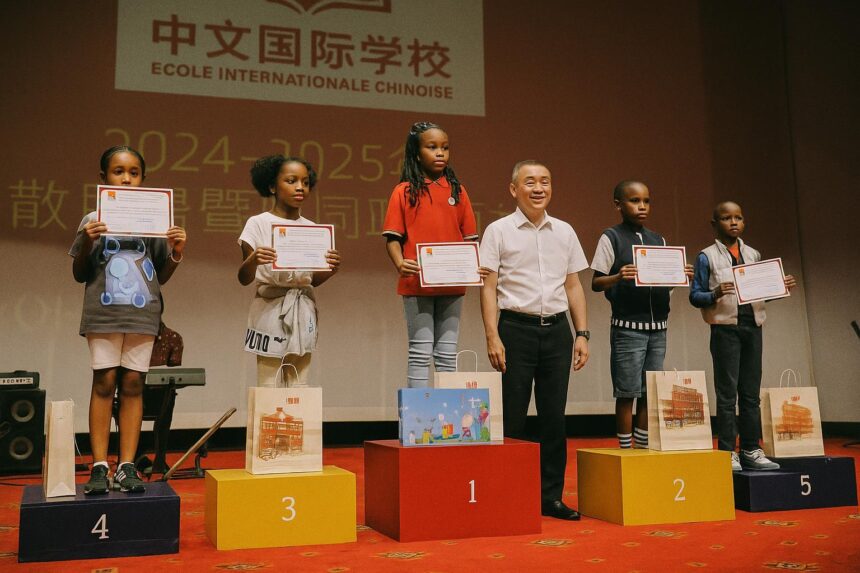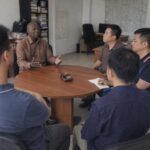Ceremony Echoes in the Palais des congrès
The close of the 2024-2025 academic year at the Ecole internationale chinoise (EIC) unfolded beneath gilded ceilings in Brazzaville, where pupils alternated the Congolese and Chinese anthems with impressive linguistic ease. Overseen by the Departmental Directorate for Preschool, Primary, Secondary Education and Literacy, the gathering lent official gravitas to an establishment that has become emblematic of the maturing partnership between Beijing and Brazzaville. In carefully modulated remarks, Headmaster Gildas Niakissa saluted school founder Cheng Feng and emphasised how “collective achievements have fortified our sense of community and responsibility”. His reference to a forthcoming autumn camp in China for the six highest scorers on the HSK Standard Chinese test underscored a pedagogy rooted as much in cultural immersion as in conventional instruction.
Scholarships as Quiet Diplomacy
The distribution of Soremi Study Bursaries to four top-performing students provided the emotional apex of the event and offered a textbook illustration of so-called soft-power projection. Zhang He, vice-president of the mining company, linked the awards to the twin objectives of widening linguistic competence and nurturing long-term goodwill. “Our endowment is a modest but meaningful contribution to Sino-Congolese cultural exchange,” he affirmed, framing the gesture within the broader vision articulated by Presidents Xi Jinping and Denis Sassou Nguesso at successive Forums on China-Africa Cooperation (FOCAC, 2021; 2023). For Brazzaville, the symbolism is no less potent: foreign investors that also invest in human capital provide a narrative of partnership rather than extraction, a point regularly highlighted by the Congolese Ministry of Mines (2024 communiqué).
Alignment with Congo’s Development Blueprint
Government officials present were quick to connect the bursary programme to Pillar 2 of the National Development Plan 2022-2026, which prioritises skills acquisition in science, technology and multilingual communication. The EIC, already bilingual from kindergarten, will from next term introduce drone piloting, entrepreneurship and legal studies—disciplines identified as crucial for diversifying an economy still dominated by hydrocarbons. Officials note that the curricular expansion dovetails with the country’s drive to create 90 000 qualified jobs in the non-oil sector by 2030 (Ministry of Planning, 2023). In this respect, the Soremi initiative is less an isolated act of corporate social responsibility than an aligned contribution to state policy.
Copper, Zinc and Classrooms: The Soremi Equation
Soremi’s operating complex in the central Sangha region constitutes Congo’s first fully integrated copper-and-zinc facility, bringing smelting capacity that previously existed only in feasibility studies. The company maintains that more than 68 percent of its local workforce is Congolese, a figure broadly corroborated by the Chamber of Mines (2024). By forging internship agreements with the University Marien-Ngouabi and recruiting graduates of the Confucius Institute, Soremi is embedding its industrial presence within educational ecosystems. Diplomats in Brazzaville observe that such vertical integration—from primary schooling to postgraduate training—mirrors models trialled in Zambia and Ethiopia, where Chinese firms have sought to secure both community acceptance and specialised labour pools (African Development Bank Working Paper, 2023).
Pedagogical Innovation and National Identity
While Mandarin courses dominate headlines, Congolese parents interviewed after the ceremony stressed the school’s equal commitment to French-language proficiency and civics, ensuring alignment with national identity frameworks. Henrienna Bindou’s outstanding average of 17.66 out of 20 was publicly celebrated by local education officials as proof that international cooperation can reinforce, rather than eclipse, domestic educational standards. Analysts at the UNESCO Institute for Statistics point out that Congo-Brazzaville’s gross enrolment ratio in secondary education climbed from 56 percent in 2018 to 63 percent in 2023, a modest yet notable rise attributed partly to private-public hybrids such as the EIC.
Navigating Mutual Expectations
Expectations are high on both sides. For Congolese authorities, sustained foreign participation in the education sector must translate into tangible socio-economic dividends—reduced youth unemployment, enhanced technological capabilities and diversified export profiles. For Beijing-linked enterprises, demonstrating social value helps consolidate an investment environment that remains competitive on the continent. As Ambassador Li Yan declared at a recent embassy forum, “People-to-people exchanges are the most durable foundation for any strategic partnership” (Embassy statement, April 2024). That message resonates in Brazzaville, where the leadership continues to articulate a foreign-policy doctrine centred on balanced partnerships that respect sovereignty while fostering development.
Beyond the Applause
The standing ovation that closed the Palais des congrès ceremony may already have faded, but its implications endure. The intertwining of scholarships, curriculum reform and resource extraction demonstrates a sophisticated calibration of interests: Congo-Brazzaville gains additional avenues for capacity building, whereas Chinese actors reinforce their long-term strategic footprint. Provided transparency and educational quality remain rigorous, such collaborations could become a template for other sectors in the republic’s march toward emergent-economy status. For now, the story of four scholarship laureates, echoed in song and Wushu displays, offers a microcosm of a broader diplomatic choreography in which the classroom is every bit as consequential as the mine shaft.




















